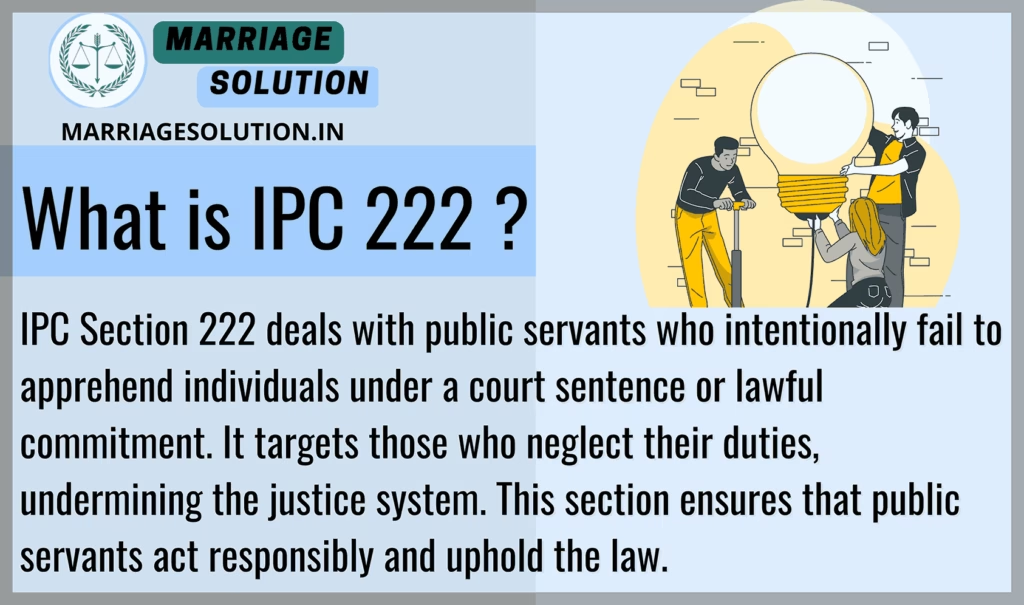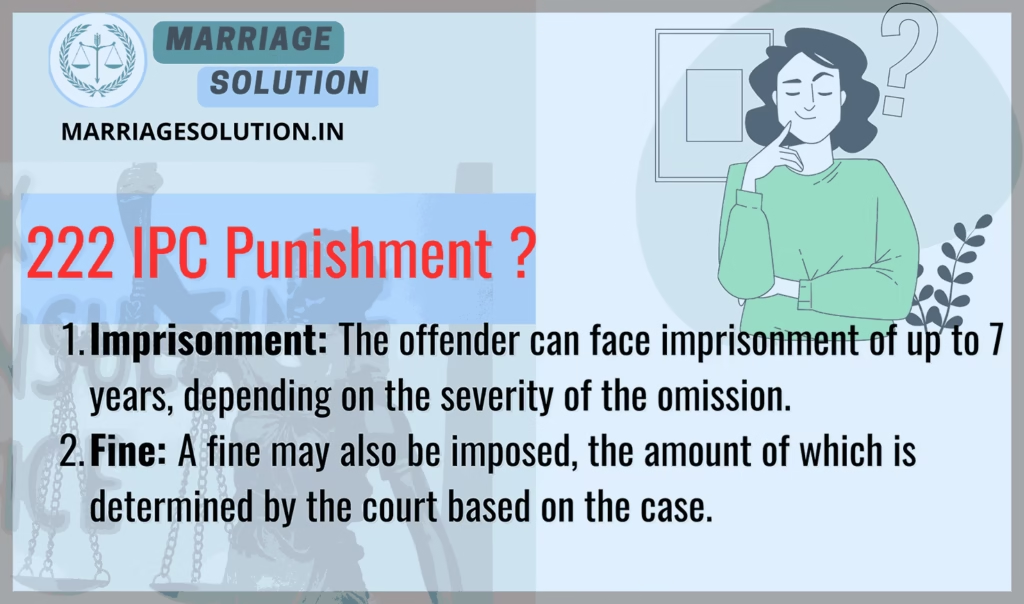Introduction of 222 IPC
IPC Section 222 addresses the intentional failure of a public servant to apprehend someone under a court sentence or lawful commitment. It aims to prevent negligence and ensure accountability in law enforcement. This section reinforces the importance of public servants fulfilling their duties responsibly.
- Introduction of 222 IPC
- What is IPC Section 222 ?
- IPC 222 in Simple Points
- Section 222 IPC Overview
- Section 222 IPC case laws
- 222 IPC Punishment
- 222 IPC Bailable or non bailable
- Section 222 IPC in short information
- IPC Section 222 FAQs
- If you need support with court proceedings or any other legal matters, don’t hesitate to reach out for assistance.
What is IPC Section 222 ?
IPC Section 222 deals with public servants who intentionally fail to apprehend individuals under a court sentence or lawful commitment. It targets those who neglect their duties, undermining the justice system. This section ensures that public servants act responsibly and uphold the law.

IPC 222 in Simple Points
- Duty to Arrest or Detain
Public servants like police or jail officials must arrest or detain individuals under court orders. If they intentionally fail to do so, it’s a crime under IPC 222. This ensures they act responsibly and follow the law. - Intentional Failure to Act
If a public servant knowingly ignores their duty to arrest someone under a court order, it’s called intentional omission. This is a serious offense and harms the justice system. - Breach of Public Trust
When officials fail to act, people lose trust in the legal system. IPC 222 ensures accountability and helps maintain public confidence in law enforcement. - Punishment for Negligence
Guilty officials face up to 7 years in jail, a fine, or both. This punishment discourages negligence and ensures officials take their duties seriously. - Ensuring Justice is Served
IPC 222 ensures that court orders are followed and justice is delivered. It holds officials accountable, making sure no one escapes punishment due to negligence.
Section 222 IPC Overview
IPC Section 222 states that a public servant legally bound to apprehend someone under a court sentence or lawful commitment who intentionally omits to do so is guilty of an offense. The act must be deliberate and violate their legal duty. This section emphasizes the importance of accountability in law enforcement.
IPC Section 222: Intentional Omission to Apprehend on the Part of Public Servant Bound to Apprehend Person Under Sentence or Lawfully Committed
1. Definition of a Public Servant Bound to Apprehend
A public servant bound to apprehend refers to individuals like police officers, jail officials, or magistrates who have the legal duty to arrest or detain individuals under a court sentence or lawful commitment. Their role is to enforce court orders and ensure that offenders serve their sentences. When such a public servant intentionally fails to perform this duty, it undermines the legal system. This section specifically targets those who neglect their responsibilities to apprehend individuals under lawful orders. It emphasizes the importance of accountability in law enforcement.
2. Intentional Omission to Apprehend
Intentional omission to apprehend means a public servant deliberately fails to arrest or detain someone they are legally required to apprehend, especially those under a court sentence or lawful commitment. This could involve ignoring a court order, letting a convict escape, or refusing to take action despite having the authority. Such actions are a serious breach of duty and a violation of their oath to uphold the law. This section ensures that public servants do not neglect their responsibilities. It reinforces the principle that law enforcement must act in the best interest of justice.
3. Knowledge of Legal Duty
The core element of this section is the knowledge that the public servant is legally bound to apprehend the individual under a court sentence or lawful commitment. The individual must be aware of their duty and intentionally choose not to fulfill it. This knowledge distinguishes the offense from situations where the public servant is unaware of their duty or unable to act. The law aims to prevent negligence and ensure that public servants act responsibly. It highlights the importance of adhering to legal obligations.
4. Impact on Public Trust
When a public servant intentionally omits to apprehend an individual under a court sentence or lawful commitment, it erodes public trust in the legal system. Citizens rely on law enforcement to ensure that court orders are enforced and justice is served. Any act of negligence undermines this trust and damages the credibility of the system. This section of the IPC aims to restore and preserve public confidence by penalizing such misconduct. It sends a clear message that negligence in duty will not be tolerated.
5. Legal Consequences for the Public Servant
A public servant found guilty under IPC Section 222 faces legal consequences, including imprisonment and fines. The severity of the punishment depends on the nature and extent of the omission. This provision acts as a deterrent, discouraging public servants from neglecting their duties. It reinforces the principle that no one is above the law, and even those in positions of power must be held accountable. The legal consequences serve to maintain the integrity of the legal system.
6. Role of Intent in Proving the Offense
Intent plays a crucial role in establishing guilt under this section. The prosecution must prove that the public servant deliberately failed to apprehend the individual under a court sentence or lawful commitment despite knowing their legal duty. Mere negligence or oversight does not constitute an offense under this provision. The focus is on the malicious intent behind the actions, which distinguishes it from other forms of misconduct. This requirement ensures that only those who knowingly neglect their duties are held accountable.
7. Examples of Violations
Examples of violations under this section include a jail official intentionally letting a convict escape or a police officer refusing to arrest someone under a court order. These actions demonstrate a clear intent to neglect their duty, which is a violation of IPC Section 222. Such examples highlight the importance of this provision in ensuring that public servants act responsibly. Real-life cases often serve as reminders of the consequences of such misconduct.
8. Importance of Accountability
Accountability is a cornerstone of good governance, and this section reinforces the need for public servants to be answerable for their actions. By penalizing intentional omissions, the IPC ensures that those in positions of power cannot act with impunity. This promotes transparency and fairness in the administration of justice. It also encourages public servants to perform their duties diligently and ethically, knowing that any deviation will have legal repercussions. Accountability is essential for maintaining the rule of law and upholding democratic values.
9. Broader Implications for Justice
The broader implications of this section extend beyond individual cases to the overall functioning of the legal system. By addressing acts of negligence by public servants, the law seeks to prevent systemic corruption and ensure that justice is not compromised. This provision contributes to a fair and equitable legal system where everyone is treated equally under the law. It also serves as a safeguard against the misuse of power, ensuring that public servants act in the best interest of society. Ultimately, this strengthens the foundation of justice and the rule of law in India.
10. Ensuring Fair and Impartial Legal System
IPC Section 222 plays a crucial role in ensuring a fair and impartial legal system. By penalizing intentional omissions, it ensures that public servants act with integrity and uphold the principles of justice. This section reinforces the importance of honesty and impartiality in legal proceedings, ensuring that justice is administered without bias or favoritism. It serves as a reminder that the legal system must remain a pillar of trust and fairness in society. This provision is essential for maintaining the credibility and effectiveness of the legal system.
Examples of IPC Section 222
- Example 1: Jail Official Letting a Convict Escape
A jail official knowingly lets a convict escape from custody, despite being legally required to keep them detained. This act of intentional omission is a clear violation of IPC Section 222. - Example 2: Police Officer Ignoring a Court Order
A police officer refuses to arrest someone under a court order, intentionally failing to apprehend the individual. This deliberate neglect of duty is an offense under IPC Section 222.
Section 222 IPC case laws
- Ramesh Kumar vs. State of Haryana (2005)
A police officer was found guilty of refusing to arrest someone under a court order. The court ruled that the act was a clear violation of IPC Section 222, and the officer was punished with imprisonment and a fine. - State of Maharashtra vs. Prabhakar Pandurang Sanzgiri (1965)
This case involved a jail official who knowingly let a convict escape. The court highlighted the need for accountability among law enforcement officers and convicted the accused under IPC Section 222. - Krishna Kumar vs. State of Rajasthan (2010)
A police officer was charged under IPC Section 222 for intentionally failing to apprehend someone under a court order. The court found the officer guilty and imposed both imprisonment and a fine, reinforcing the importance of following legal procedures. - State of Karnataka vs. Venkatesh (2018)
In this case, a jail official was accused of intentionally letting a convict escape. The court ruled that the act was a deliberate violation of IPC Section 222 and sentenced the accused to imprisonment.
222 IPC Punishment
- Imprisonment: The offender can face imprisonment of up to 7 years, depending on the severity of the omission.
- Fine: A fine may also be imposed, the amount of which is determined by the court based on the case.

222 IPC Bailable or non bailable
IPC Section 222 is a non-bailable offense. Bail can only be granted at the discretion of the court, reflecting the seriousness of the crime.
Section 222 IPC in short information
| IPC Section | Offense | Punishment | Bailable/Non-Bailable | Cognizable/Non-Cognizable | Trial By |
|---|---|---|---|---|---|
| 222 | Intentional omission to apprehend by a public servant bound to apprehend someone under a court sentence or lawful commitment | Imprisonment up to 7 years, or fine, or both | Non-Bailable | Cognizable | Magistrate First Class |
IPC Section 222 FAQs
Who can be charged under IPC Section 222?
Only public servants, such as police officers or jail officials, who are legally bound to apprehend individuals under a court sentence or lawful commitment can be charged under this section.
What does “intentional omission” mean in IPC 222?
It refers to a public servant deliberately failing to arrest or detain someone they are legally required to apprehend, especially those under a court sentence or lawful commitment.
Is intent necessary to prove an offense under IPC 222?
Yes, intent is crucial. The prosecution must prove that the public servant knowingly failed to perform their duty.
Can a private individual be charged under IPC 222?
No, this section applies only to public servants. Private individuals cannot be charged under IPC 222.
What is the difference between IPC 222 and IPC 221?
IPC Section 222 deals with intentional failure to apprehend individuals under a court sentence or lawful commitment, while IPC Section 221 deals with intentional failure to apprehend offenders in general.
If you need support with court proceedings or any other legal matters, don’t hesitate to reach out for assistance.
Court or any other marriage-related issues, our https://marriagesolution.in/lawyer-help-1/ website may prove helpful. By completing our enquiry form and submitting it online, we can provide customized guidance to navigate through the process.
